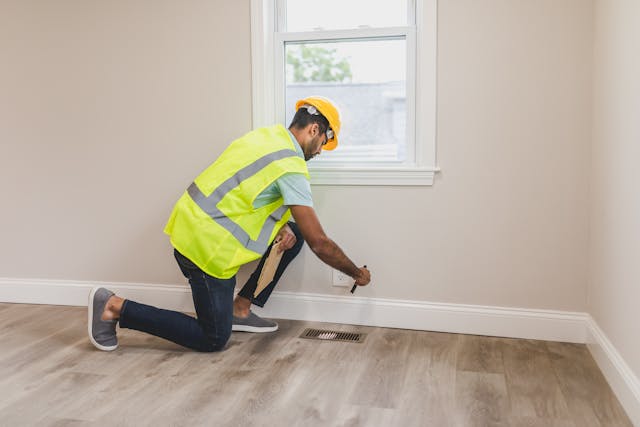Property owners often wonder how repair costs are handled when working with a property management company. Understanding the financial dynamics in this arrangement is essential to avoid misunderstandings and ensure your property is well-maintained without unnecessary expenses. Let’s break down how this works, where the responsibility lies, and what you can expect in different scenarios.
Who Pays for Repairs?
The short answer: property owners always foot the bill for repairs. Property management companies act as intermediaries who coordinate and oversee the maintenance process. Their role includes finding qualified contractors, getting estimates, and ensuring the work is completed properly. However, the costs themselves are ultimately charged to the property owner.

This arrangement is outlined in the management contract. Before signing, it’s critical to understand which services the company will handle directly, how repair costs will be authorized, and what limits (if any) are placed on their spending authority.
Setting Maintenance Thresholds
Most property management contracts include a maintenance threshold, which is a pre-approved amount the company can spend on repairs without requiring the owner’s permission. These thresholds are typically set between $200 and $500, depending on the type of property and the agreement between the owner and the manager.
For routine issues like fixing a leaking faucet or replacing a broken thermostat, this system works well. Repairs within the threshold are handled quickly, ensuring minimal disruption for tenants and avoiding unnecessary delays caused by seeking owner approval.
If a repair exceeds this amount, the property management company must contact the owner to get the green light before moving forward. Setting a comfortable limit allows owners to maintain control over larger expenses while trusting the management company to handle smaller, day-to-day issues.
Emergency Repairs and Exceptions
Emergency repairs are an exception to the maintenance threshold. When urgent action is required to protect the property or ensure tenant safety, property management companies often act without prior approval. This includes situations like burst pipes, electrical failures, or roof leaks during heavy rains.
The contract usually includes provisions for emergency repairs, giving the management company authority to handle these situations promptly. Afterward, the owner is informed of the costs and provided with a detailed breakdown of what was done and why.
One owner I worked with experienced a major plumbing issue during a holiday weekend. The water heater burst, flooding a portion of the rental. We coordinated an emergency plumber and clean-up crew, and the issue was resolved before it could escalate. Though it required immediate action without prior approval, clear communication afterward kept the owner satisfied.
Preventative Maintenance Plans
Many property management companies offer preventative maintenance plans as part of their services. These programs involve regular inspections, routine servicing of major systems, and small repairs to avoid larger, costlier issues down the road.
While these plans are optional, they’re highly recommended for owners looking to protect their investment. Preventative maintenance can extend the life of HVAC systems, plumbing, and electrical setups, saving significant money over time. Owners typically pay an annual fee or opt into recurring costs for these services, and the property manager ensures everything runs smoothly.
One of my clients who owns several rental properties credits a preventative maintenance plan for drastically reducing repair costs. After investing in regular HVAC servicing, they noticed fewer breakdowns and lower energy bills, which translated into happier tenants and higher profits.
Vendor Selection and Cost Control
Property management companies often have long-standing relationships with contractors, electricians, plumbers, and other vendors. These partnerships can benefit owners in several ways. Trusted vendors know the properties well, offer competitive pricing, and respond faster than someone called in off the street.
When comparing estimates for larger repairs, a good property manager will present options, explain the differences, and recommend the best course of action. Owners are encouraged to ask questions and request alternative bids if they’re not comfortable with the pricing or scope of work.
Beware of management companies that mark up repair costs or insist on using in-house contractors without transparency. A reputable manager will provide detailed invoices and receipts, ensuring you see exactly where your money is going.
Owner Responsibilities
While property management companies handle repairs, owners play a key role in keeping everything running smoothly. Setting a clear budget for repairs, funding a reserve account, and addressing deferred maintenance before it becomes a problem are all part of an owner’s responsibility.
Some owners choose to maintain direct involvement in certain types of repairs, particularly for specialized projects or upgrades. Others prefer to delegate entirely, trusting the property manager to handle everything. Whatever your approach, aligning your expectations with the management company ensures a seamless working relationship.
Owners who neglect regular upkeep often face larger repair bills down the line. Neglected gutters, poorly maintained HVAC systems, or aging roofs can snowball into costly projects that eat into profits. Proactive maintenance, managed by your property management company, prevents these issues from spiraling out of control.
Handling Disputes Over Repair Costs
Occasionally, disagreements arise between owners and management companies regarding repairs. This can happen if the owner feels a repair was unnecessary, overpriced, or poorly executed. Resolving these disputes requires clear communication and a willingness to revisit the management agreement.
Owners should review their contracts carefully and raise concerns early. Most property managers value long-term relationships and will work to address misunderstandings. Documenting repairs with photos, invoices, and contractor notes helps ensure transparency on both sides.
One client I worked with questioned the need for a roofing repair after a contractor flagged potential issues. To ease their concerns, we obtained a second opinion, provided detailed inspection reports, and broke down the costs into manageable steps. The extra effort earned their trust, and the repairs moved forward without further conflict.
Insurance and Warranty Coverage
Insurance plays a role in reducing out-of-pocket repair costs for major issues. Damage caused by natural disasters, fire, or vandalism is often covered under a landlord insurance policy. Property management companies can assist with filing claims and coordinating repairs in these situations.

Warranties on appliances or major systems also help offset repair costs. Owners should keep warranty information on hand and share it with their property manager. If an issue arises, warranty coverage can significantly reduce expenses.
Final Thoughts
Property management companies streamline the repair process, saving owners time and ensuring tenants remain satisfied. While owners ultimately cover the costs, effective communication and clear contracts prevent surprises. Repairs are part of owning any property, but with the right management team, they don’t have to be a headache.
